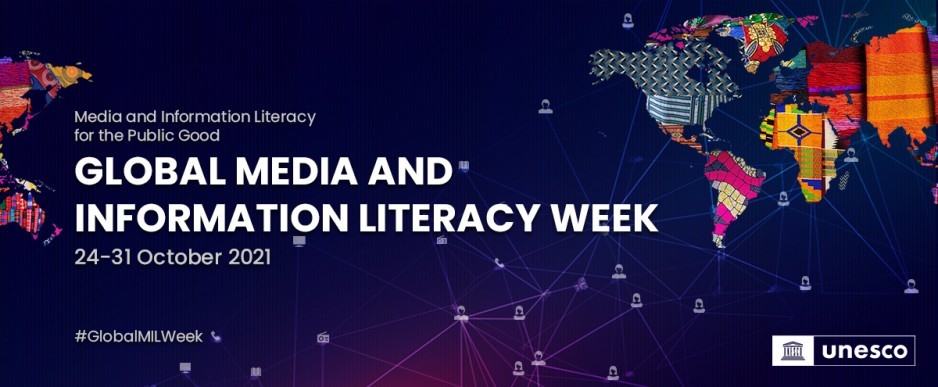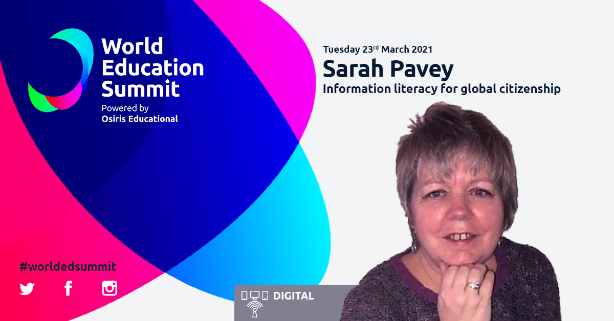Sarah Pavey, Schools Representative for the CILIP Information Literacy Group, reports on a recent UNESCO webinar to launch the Global Standards on Media and Information Literacy Curricula Development Guidelines.
On 11th November 2021 I attended a webinar offered by UNESCO as part of their Media & Information Literacy Week. This was to celebrate the publication of the Global Standards for Media and Information Literacy Curricula Development Guidelines. The event was organized by UNESCO and the Republic of Serbia, in cooperation with the European Commission.
In September 2021, UNESCO published the revised MIL curriculum “Media and Information Literate Citizens: Think critically, Click Wisely”. The global standards have been drawn from much of this work. The standards will:
“focus on necessary processes at various levels of society and offer an integrated set of core and common learning outcomes that all stakeholders seeking to develop integrated curricula on media and information literacy should consider”.
The idea is to be non-prescriptive and to target the policy makers responsible for curricula development and media and information literacy related programmes which might include curriculum developers and planners, educators, NGO leaders, experts and practitioners of MIL. The document will be made available in many languages.
My interest in attending came from a curiosity about how this might be implemented in the rather rigid school curriculum we follow in England. Having listened to the speakers and asked questions it became clear there is no easy solution to bridging the gap between the forward thinking ideas of UNESCO and the practice in this country regarding MIL within the curriculum. The webinar was excellent for understanding the global approach to growing MIL literate citizens of the future.
Ms Slavica Trifunovic, Assistant Minister of Culture and Information, Republic of Serbia
Slavica outlined the importance placed upon MIL in Serbia and how any program delivered to students needed the support of business and parents as well. I know from my own work with information literacy in schools how seriously countries such as Serbia value these competencies.
Ms Marielza Oliveira, Director for Partnerships and Operational Programme Monitoring, Communication and Information Sector, UNESCO
Marielza explained how the global standards had been triggered in 2019 in Belgrade and then outlined the process of collecting data. More than 100 countries gave responses which were drawn from multiple stakeholders. The questions considered alignment of MIL with the Curriculum followed and focused on processes to ensure competencies could be gained. She stressed that if MIL issues are to be addressed globally then it is vital we have published international standards.
Mr Audrius Perkauskas, Deputy Head of Unit, Directorate-General for Communication Networks, Content and Technology (DG CONNECT), European Commission
This call for internationalism provided a useful link to the talk from Audrius. He explained that in Europe MIL is a legal requirement in the Curriculum. Although it is up to individual countries to devise their curriculum they need to include MIL and there is even a specific section on video sharing which has to be incorporated. The European Commission also has a body which specifically monitors MIL content in the curriculum and the Nations will need to report back in 2022 to explain how they have collaborated to produce good content and outcomes. One of the drawbacks of no longer being in Europe for us which is a pity as it would have been very interesting to see how our own Department for Education tackled this! Indeed, the answer given to my question raising this point was “you are no longer in Europe”.
Ms Lisa Williams-Lahari, Public Affairs Adviser, Pacific Islands Forum
Lisa spoke from the viewpoint of island nations at the very forefront of the climate crisis. She explained how MIL education was essential for saving the planet in the future by developing ecologically aware citizens who could separate fact from fiction.
Mr Jerome Morrissey, Head of Global eSchools and Communities Initiative, African Union Thematic Clusters for the Continental Education Strategy for Africa
Jerome welcomed the new standards saying there was a urgent need for MIL in education but that all stakeholders need to be involved not just the students. He emphasized that the curriculum was key and that it needed to be present in every part, every subject. I asked a question about well meaning external stakeholders perhaps developing products that did not really engage with the reality of the curriculum and he said that this was a common issue and needed to be addressed too. He added that a more defined curriculum might be useful in this respect.
Overall, this was a very enlightening webinar containing a lot of food for thought. I am looking forward to reading the full guidelines when they are published on the UNESCO website in 2022.
UNESCO (2021) Launch of the Global Standards on Media and Information Literacy Curricula Development Guidelines. Available at: https://events.unesco.org/event?id=Launch_of_the_Global_Recommendations_on_Media_and_Information_Literacy_Curriculum_Development_Guidelines3952275575&lang=1033
UNESCO (2021) Media and Information Literate Citizens: Think critically, Click Wisely. Available at: https://unesdoc.unesco.org/ark:/48223/pf0000377068



